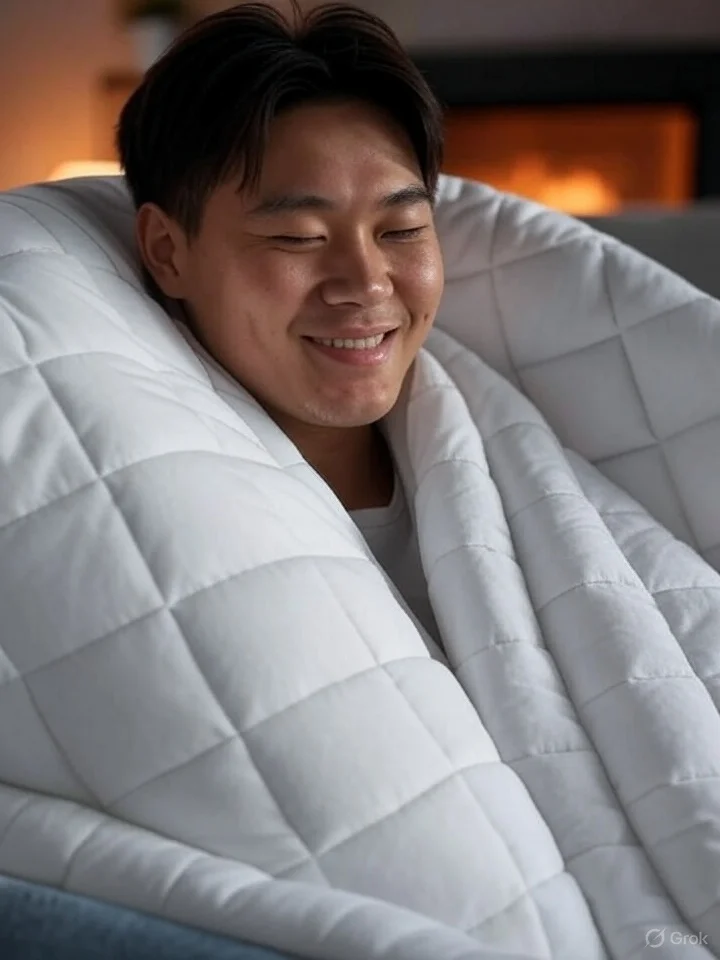Unveiling the Science: Do Weighted Blankets Really Help with Sleep and Anxiety?
The quest for better sleep and reduced anxiety has led many to explore various tools and techniques. Among these, weighted blankets have surged in popularity, promising a comforting, hug-like sensation that can soothe the mind and body. But do these blankets live up to the hype? This article delves into the science behind weighted blankets, exploring their potential benefits, limitations, and how they might fit into your overall wellness strategy.

Understanding Weighted Blankets: How They Work
Weighted blankets, as the name suggests, are heavier than standard blankets. They typically contain materials like glass beads or plastic pellets, distributed throughout the fabric to add weight. This weight ranges from about 5 to 35 pounds, with the optimal weight often suggested to be around 10% of the user’s body weight. The core principle behind their purported effectiveness lies in a therapeutic technique known as Deep Pressure Stimulation (DPS).
DPS involves applying gentle, yet firm, pressure across the body. This can be likened to a firm hug, swaddling a baby, or even the sensation of a massage. This pressure is thought to stimulate the production of serotonin and melatonin, hormones associated with relaxation and sleep. At the same time, it can help reduce cortisol levels, the primary stress hormone. This interplay of hormonal shifts is believed to promote a sense of calm and ease anxiety, ultimately contributing to better sleep quality. The calming effects of DPS are well-documented in certain therapeutic settings, but applying these findings to the use of weighted blankets is more nuanced and the subject of ongoing research.
Potential Benefits: What the Research Suggests
The potential benefits of weighted blankets are diverse, extending beyond just sleep. While research is still evolving, several areas show promising results:
Anxiety Relief: A Calming Embrace
One of the most commonly cited benefits of weighted blankets is their potential to reduce anxiety. The gentle pressure they provide can mimic the feeling of being hugged, which is known to trigger the release of feel-good hormones. Several small studies have suggested that using a weighted blanket may help lower anxiety levels. This can be particularly beneficial for individuals who experience racing thoughts or feel restless before bed. However, it’s important to recognize that a weighted blanket may not be a standalone solution for severe anxiety and should be used in conjunction with other evidence-based therapies. The calming effects may also be particularly helpful in the workplace, read this article about Workplace Mental Health: Boosting Productivity & Well-being to understand how it can help in the workplace: https://befullbehealth.com/2025/mental-health-workplace-productivity/
Improved Sleep Quality: More Than Just Falling Asleep
Many people turn to weighted blankets hoping to improve their sleep. While research is still emerging, some studies have indicated that weighted blankets can help improve sleep quality, reduce the time it takes to fall asleep, and decrease the frequency of nighttime awakenings. One study involving individuals with insomnia found that those using weighted blankets reported improvements in sleep quality. It is important to remember, though, that sleep is a complex process influenced by many factors. If you have difficulty sleeping, you can check out this article on Magnesium for Sleep: Does It Really Work? Benefits, Myths & Science: https://befullbehealth.com/2025/magnesium-for-sleep-does-it-really-work-benefits-myths-science/
Managing Autism-Related Sleep Concerns
Weighted blankets have long been used as a therapeutic tool for individuals with autism spectrum disorder (ASD). The DPS provided by these blankets can have a calming effect, potentially reducing anxiety and improving sleep. While research specific to weighted blankets for individuals with ASD is limited, many individuals and families report positive results. The American Academy of Neurology acknowledged that they haven’t found evidence against weighted blankets. In other words, they might help, or they might not. But they could be worth a try.
Reducing Anxiety in Medical Settings
Beyond their use at home, weighted blankets are being explored in clinical settings. Some studies suggest that weighted blankets can help reduce anxiety and distress during medical procedures, such as dental treatments or cancer infusions. This application highlights the potential for weighted blankets to provide comfort and a sense of control during stressful situations.
Limitations and Considerations: What You Need to Know
While weighted blankets hold promise, it’s essential to approach them with realistic expectations and an understanding of their limitations:
Research is Ongoing: The Need for More Evidence
The current body of research on weighted blankets is limited, often involving small sample sizes. This means that while initial findings are encouraging, more robust, large-scale studies are needed to confirm the long-term effectiveness and benefits of weighted blankets.
Not a Cure-All: Complementary Approach
Weighted blankets are best viewed as one tool in a broader approach to sleep and anxiety management. They are not a substitute for good sleep hygiene practices, such as maintaining a consistent sleep schedule, creating a relaxing bedtime routine, and avoiding screen time before bed. For sleep and anxiety, it’s also vital to recognize the importance of lifestyle factors like diet and physical activity. To know about the benefits of exercise, read this article: https://befullbehealth.com/2025/exercise-benefits-supercharge-your-health-well-being-the-ultimate-guide/
Weight and Comfort: Finding the Right Fit
The weight of the blanket is crucial. It should be heavy enough to provide the desired DPS, but not so heavy that it causes discomfort or restricts movement. It is generally recommended that the blanket weighs around 10% of your body weight.
Individual Variability: Not a Universal Solution
Weighted blankets may not work for everyone. Some individuals may find the weight uncomfortable or claustrophobic. Others may not experience any noticeable benefits. The effectiveness of weighted blankets can vary depending on individual preferences, underlying health conditions, and the specific needs of the user.
Choosing and Using a Weighted Blanket: Practical Tips
If you’re considering trying a weighted blanket, here’s what you should keep in mind:
Selecting the Right Blanket: Key Features
- Weight: Choose a blanket that is approximately 10% of your body weight.
- Size: Consider the size of your bed and your personal preferences.
- Material: Look for soft, breathable materials like cotton or bamboo.
- Construction: Check the quality of the stitching and the distribution of the filling.
Integrating the Blanket into Your Routine
- Gradual Introduction: Start by using the blanket for short periods and gradually increase the time.
- Bedtime Routine: Incorporate the blanket into a relaxing bedtime routine.
- Listen to Your Body: Pay attention to how the blanket makes you feel and adjust accordingly.

Beyond the Blanket: Holistic Strategies for Well-being
While weighted blankets can be a helpful tool, it’s essential to address sleep and anxiety through a holistic approach:
Prioritize Sleep Hygiene
- Establish a regular sleep schedule, even on weekends.
- Create a relaxing bedtime routine that may include a warm bath, reading, or gentle stretching.
- Make sure your bedroom is dark, quiet, and cool.
- Avoid caffeine and alcohol before bed.
- Limit screen time before bed.
Consider Lifestyle Factors
- Eat a balanced diet rich in whole foods.
- Engage in regular physical activity.
- Practice relaxation techniques such as deep breathing, meditation, or mindfulness. Read this article about Mindful Movement: Unlock Your Inner Peace and Transform Your Health: https://befullbehealth.com/2025/mindful-movement-unlock-your-inner-peace-and-transform-your-health/
- Manage stress through healthy coping mechanisms.
- For a 30-day meal plan, read this article: https://befullbehealth.com/2025/revolutionize-your-health-a-delicious-30-day-mediterranean-meal-plan/
Seek Professional Help
If you’re experiencing persistent sleep problems or anxiety, consult a healthcare professional. They can help diagnose any underlying conditions and recommend appropriate treatment options. If you’re looking to improve your well-being, you can check out this article about Boost Your Health This Week: Simple, Proven Wellness Tips for a Better You: https://befullbehealth.com/2025/boost-your-health-this-week-simple-proven-wellness-tips-for-a-better-you/
Conclusion: Weighing the Options
Weighted blankets offer a promising approach to improving sleep and managing anxiety through the calming effect of DPS. While the science is still developing, the potential benefits are undeniable. To harness the power of weighted blankets, remember to choose the right weight, integrate them into a comprehensive sleep hygiene routine, and adopt a holistic approach to well-being. The most important thing is to listen to your body and find what works best for you. When combined with healthy lifestyle choices and, when necessary, professional guidance, a weighted blanket could be a valuable addition to your wellness toolkit.











Post Comment